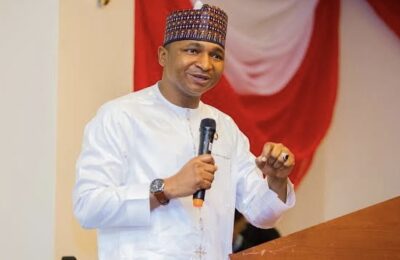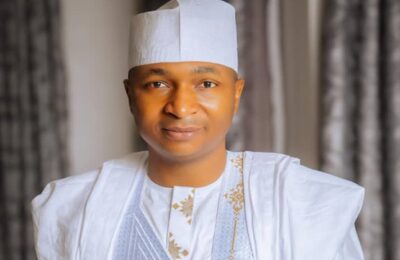“The world is debating local solutions to global problems using the Sustainable Development Goals (SDGs) and Agenda2063 as a benchmark in accelerating inclusive development that foster economic growth” ~ Hamzat.

A modern state must be capable of providing socio-economic services; driving structural reforms and economic transformations; and mobilizing citizens for social change. Conversely, an underdeveloped state is characterized by (at least) the following dysfunctions: a hyper-centralization of authority and administrative decision-making; an over-dependent citizenry, powerless and incapable of serious engagements with political executives. Inevitably, these dysfunctions produce corruption, clientelism and rent-seeking; neo-patrimonial redistribution of public resources; and opaque administration of coffers by officials which they consider a normal extension of their personal wealth. Indeed, great challenges present great opportunities!
In Nigeria, this is the picture of the Federal (central) government in general, and Local (grassroots) governments in particular. Public infrastructure in disarray; widespread and extreme poverty; and deep social inequality. Specifically, health care, basic education, economic opportunities, social protection, etc. are poorly delivered and/or broken. Critically, the situation is dire but neither hopeless nor incurable.
Since politics is local; solutions to broken politics are not unfamiliar principles. As far back as 1914, the British colonial masters had fully recognized the need for a local government system to serve as the foundation for a democratic political system at the centre. The system was to be efficient enough to run the services required by the people, representative so as to endure and local – close to the people, in order to be beneficial and meaningful. Therefore, local government system as we know it today in Nigeria can be traced back to the system of indirect rule instituted by the Lugard’s government in 1914. By simple logic, this was for convenience – to effectively govern the vast territory created by the amalgamation policy.
Consequently, in July 1975, as part of its political programme preparatory to the transition to civilian rule, the military government of General Murtala Mohammed announced a commitment to a systematic and deliberate re-organization of the local government system. Accordingly, General Olusegun Obasanjo, who took over from General Murtala reinforced the policy that “the local government reforms are based on the need to stabilize and rationalize government at the local level which entails the decentralization of some functions of the state government to the local levels in order to harness local resources for rapid development and ensure grassroots participation in our developmental process”. For the first time, the local government was officially recognized as the Third Tier of government in Nigeria. Such was the spirit of Local Government Reforms of 1976.
The 1999 constitution of the Federal Republic of Nigeria (FRN) recognizes 774 Local Government Areas (henceforth LGAs). Financially, the LGAs are supposed to generate internal revenue through property, capitation and general rating. However, statutory allocation from the Federal and State governments form the main support of the LGAs. Under the current sharing formula, the Federal Government takes the lion’s share – 52.68% from the Federation Account. The 36 states take 26.72% while the 774 LGAs make do with the remaining 20.60%.
Howbeit, because the 36 state governments operate a State Joint Local Government Account (SJLGA) with the LGAs, state governors control the cumulative 48% of federation revenues that are allocated to the states and LGAs. Although the 1999 constitution of the FRN recognizes LGAs as the Third Tier of government, it is not treated as an autonomous body in a great number of respects. First, the functions performed by the LGAs in most states are those “permitted” by the state government rather than those specifically listed in the constitution. Second, the Federal government’s channeling of local government budgetary allocations through the SJLGA (instead of sending it directly to the LGAs) is a tacit subscription to the notion of non-autonomy. This provision – fiscal non-autonomy, became the bane of local government administration in Nigeria, up till today.

It is in efforts to debottleneck administration of LGAs and ensure financial independence that the Nigerian Financial Intelligence Unit (NFIU) Guidelines of May 2019 was pronounced by the central government. Prominent Nigerians and legal luminaries have expressed informed views – both in morality and constitutionality, on the new guidelines. Under the current revenue sharing (Federal Allocation) arrangement, and obvious constitutional technicalities, state governors possess tremendous fiscal power and freedom but little accountability in the use of the monies under their control. There are few checks and balances because state legislatures are typically weak. State governors exercise undue influence and most legislators serve, regrettably, as political pawns.
Surprisingly, the constitution provides for immunity for governors while in office, making it difficult (almost impossible) to hold them answerable and/or accountable. In the 20 years of democratic government (fourth republic) in Nigeria, only a very few governors behave in a fiscally responsible manner as required of them by Nigerian statutes. They run their cabinet meetings and conduct official matters (budgets, strategic policy documents, audit reports, etc.,) like occultism or esoteric organizations. As active citizens, if you insist on a few hard questions on fiscal transparency through legal instruments e.g. Freedom of Information Act 2011, some governors do not mind sending armed personnel against you – for intimidation and suppression.

Generally, because of rabid politics, the legality of the new NFIU guidelines remains largely argumentative. In the meantime, permit that we defer the constitutionality of the policy to the courts since lawsuits have been appropriately instituted. Whatever the outcome of the judicial challenges, the moral foundation of the policy must not be hastily sacrificed. What is democracy without dividends? What is development without inclusion? Grassroots populations remain the most marginalized segments of the Nigerian society, abandoned and neglected in most instances. Propositions for fiscal autonomy of LGAs are not for semantics. From the history of national development, they are genuine and compelling. While they are not one-size-fits-all, it does possess potential as a game-changer.
For the second time, after 1976 Local Government Reforms, a government and/or regime appears passionate and committed to rapid and inclusive rural development seen by her policy interventions, notably by the National Social Investment Programme (NSIP) and Fiscal Autonomy for LGAs. The point is simple: the spirited intentionality of Fiscal Autonomy for LGAs to strategically cause a disruption in the administration of the financially-starved third tiers of government will surely accelerate grassroots revitalization and rapid rural development. Another laudable policy option that needs widespread public support and reinvigorated political will is Financial Autonomy of State Legislature and State Judiciary.
At this very point in our national life, one of the obligations we – patriotic citizens, owe those we have entrusted with political powers is constructive engagements. At one time, we rebuke bad public policies, at the other time we provide popular support for transformative reforms and public choices. Such is the spirit and the very essence of civic participation and democratic governance. For it is often said: precepts upon precepts, a house is built. God bless Nigeria!
Co-written by Ani, Nwachukwu Agwu and Hamzat Lawal.
Nwachukwu is a rural development specialist and a Phd candidate at the University of Nigeria, Enugu while Hamzat Lawal is an international development campaigner; activist and founder of Connected Development, Abuja.
For correspondence, please contact: nwachukwu@connecteddevelopment.org




